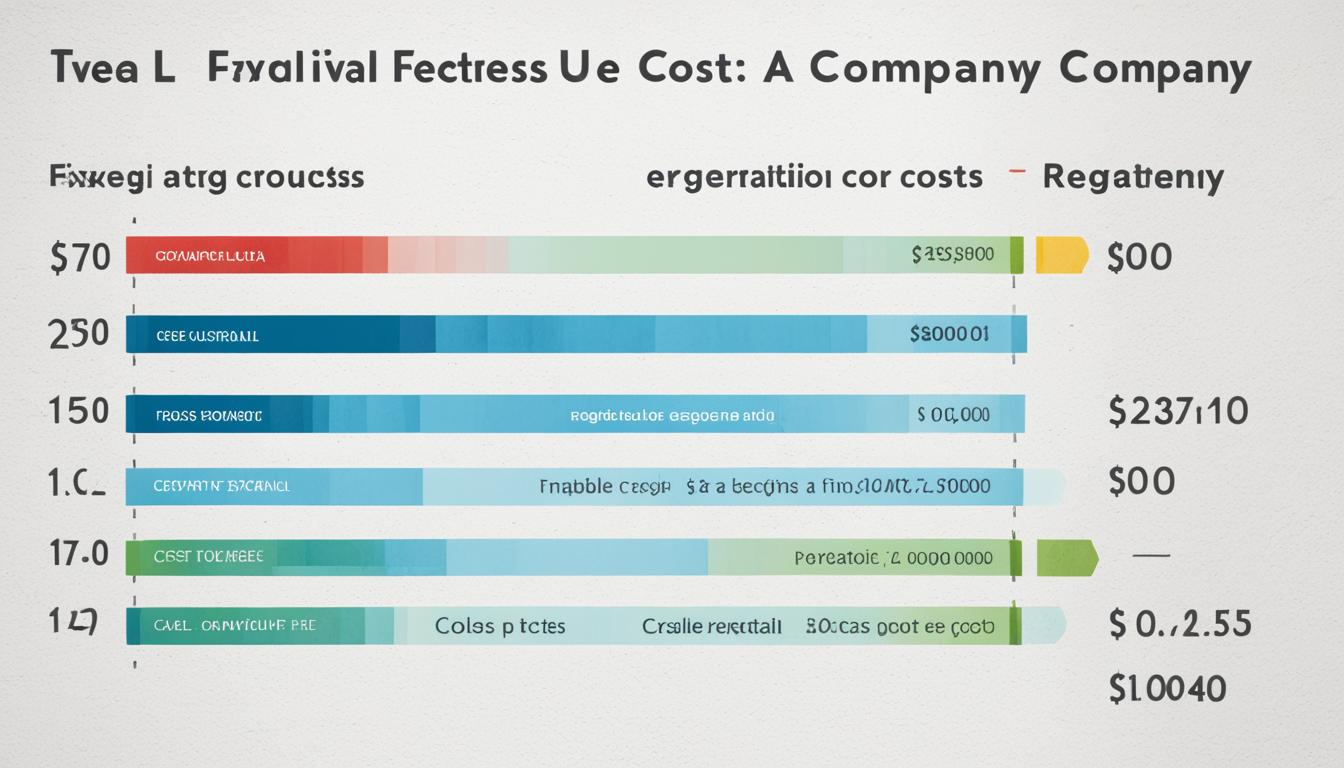Starting a company in Italy offers both chances and challenges for UK entrepreneurs. It’s key to know the costs involved before diving in. This guide will cover the costs of setting up a company, including start-up and ongoing expenses, and legal needs. Knowing these will help entrepreneurs make smart choices for their business in Italy.
Key Takeaways
- The cost to set up a company in Italy varies based on the type of business structure chosen.
- Understanding local regulations is crucial for smooth company registration in Italy.
- Initial and ongoing expenses for businesses in Italy should be carefully calculated.
- Legal documentation and compliance are important factors to consider when starting a business.
- Tax implications can significantly impact the overall cost of operating a company in Italy.
Introduction to Setting Up a Company in Italy
Starting a business in Italy offers great benefits for both new and experienced entrepreneurs. Italy’s rich culture and strategic location make it a great place for business. The economy is diverse, supporting creativity and innovation across many sectors.
The business scene in Italy mixes old and new industries, with a focus on technology and sustainability. Entrepreneurs can find opportunities in hospitality, fashion, food and beverage, and technology. It’s important to understand the costs and legal rules when starting a business here.
When looking to start a business in Italy, it’s key to know the initial and ongoing costs. This knowledge helps in making smart choices when entering the market. Setting up a business in Italy is full of chances for success for those ready to face the challenges.
Understanding the Business Landscape in Italy
The Italian business scene is unique for those looking to start a business there. It has a varied economy with main sectors like manufacturing, luxury goods, and tourism. These areas show how Italy’s economy is diverse and full of business chances.
Italy’s history and culture make it a top spot for luxury brands. The tourism industry is also booming, offering chances in hospitality and travel services.
It’s key to know what Italian consumers like. They often choose quality over quantity, which affects what they buy. This means marketing and products must match local tastes well.
Looking at the market size and competition is important. Italy’s location in Europe means it’s close to a big market. But, there’s a lot of competition, especially in well-known sectors. Investors should do a deep market analysis to find new chances and trends.
In short, UK entrepreneurs need to really get to know the Italian business scene. By focusing on key sectors, understanding what consumers want, and doing a detailed market analysis, they can find great business chances in Italy.
Types of Business Structures in Italy

Italy has many types of companies for entrepreneurs to choose from. Each type has its own benefits and rules. It’s important for business owners to know their options before making a choice.
Common Italian business entities include:
- Sole Proprietorships: This is a simple option for one-person businesses. The owner is personally responsible for any debts, which can be risky.
- Partnerships: These are for businesses run by two or more people. The way liability is shared can vary. Some partnerships mean all partners are on the hook for debts, while others protect some partners.
- Limited Liability Companies (LLCs): These are a good choice for small to medium-sized businesses. They protect the owners’ personal assets from business debts. But, they do require official registration and follow certain rules.
- Joint Stock Companies: Best for big businesses, this type lets companies raise money by selling shares. Owners are only liable up to the amount they invested. However, these companies face strict rules.
Choosing the right business structure in Italy affects many things like how flexible you can be, your tax situation, and your business plan. It’s key to understand these Italian business entities to follow the law and grow your business.
Cost to Set Up a Company in Italy
Setting up a company in Italy means you’ll face both upfront and ongoing costs. It’s key to know the difference between initial and ongoing expenses. This helps UK entrepreneurs plan their budgets better. We’ll look at the main costs for starting and running a business in Italy.
Overview of Initial Costs
Initial costs in Italy include various fees that entrepreneurs should be ready for. These include:
- Company registration fees
- Notary costs
- Legal and consulting fees
- Minimum capital requirements
These costs depend on the business type and specific needs. Knowing these expenses is crucial for a solid financial plan before starting.
Ongoing Operational Expenses
After setting up, ongoing costs can impact profits. These include:
| Expense Type | Estimated Monthly Cost (€) |
|---|---|
| Utilities (electricity, water, internet) | 300 – 600 |
| Employee Salaries | 1,500 – 3,000 |
| Office Rent | 1,000 – 2,500 |
| Administrative Costs | 200 – 400 |
Knowing these costs helps entrepreneurs stay financially stable. This is key for growth and success in Italy.
Legal Requirements for Company Registration
Setting up a company in Italy means you must follow certain legal steps. It’s key to know these laws to follow the rules of business in Italy.
First, you need to create a shareholder agreement. This document details the rights and duties of the shareholders. It helps avoid disagreements among partners.
Next, picking a unique company name is crucial. The name should match the business and not be the same as another company’s. Checking if the name is available is a must before you proceed.
Then, you must register with the Companies’ Register. This makes your company official and legally recognised. You’ll need to provide documents like the shareholder agreement, ID documents, and proof of your office address.
It’s also vital to follow Italian labour laws. This means knowing about employee rights, contracts, and working conditions. This ensures your business meets all legal requirements.
If you don’t follow these rules, you could face fines or problems later. So, understanding all the legal aspects in Italy is key for business success.
Costs Involved in Legal Documentation
Starting a company in Italy means understanding the legal documents and their costs. Entrepreneurs must consider these costs carefully. Drafting contracts in Italy is a key part of these costs. These contracts outline the rules for how the company will work, who will be involved, and what everyone’s rights and duties are.
It’s crucial to work with skilled legal experts to understand Italian law. Legal fees can change a lot, based on the lawyer’s experience and the complexity of the documents. A simple contract might be cheaper than a detailed one with many parties and complex rules.
Notary services are key for making some agreements official. These services can be costly, especially if many documents need to be verified. If you’re from another country, you might also need to translate documents. This adds to the overall cost of setting up a company.
Here’s a list of possible costs for legal documents in Italy:
| Legal Documentation Type | Estimated Cost (€) |
|---|---|
| Drafting simplified contracts | 500 – 1,000 |
| Comprehensive contract preparation | 1,000 – 3,000 |
| Notary services | 300 – 1,000 |
| Document translation | 100 – 500 |
Knowing and planning for legal documentation costs is key for starting a business in Italy. Being prepared and budgeting for these costs can prevent unexpected expenses during the setup.
Tax Implications for Businesses in Italy
For businesses in Italy, knowing about taxes is key. This includes VAT Italy and corporate tax rates Italy. These affect how you plan your finances. This part explains these taxes to help new entrepreneurs.
Value Added Tax (VAT)
In Italy, most goods and services have a 22% VAT rate. But, some things like food, medicines, and cultural events have lower rates, at 10% or 4%. Some areas like healthcare and education don’t have VAT at all. It’s important for businesses to check where they stand to pay less tax.
Corporate Tax Rates
Corporate tax in Italy is about 24%. But, there are special deals for start-ups and small businesses. These deals can lower what you pay in taxes, especially if you’re new or investing in certain areas. Planning well with these tax rates can really help your business’s finances.
Accounting and Bookkeeping Expenses
Starting a business in Italy means you need to keep an eye on your finances. You must follow the local rules and keep your money records right. This often means you’ll need to hire experts in accounting in Italy.
There are many things that affect how much bookkeeping costs. The price can change based on how complex your finances are. Here’s a rough idea of what you might pay for different services:
| Service | Average Cost (€) |
|---|---|
| Basic Bookkeeping | 300 – 800 |
| Tax Preparation | 150 – 500 |
| Monthly Financial Reports | 200 – 600 |
| Year-End Accounts | 500 – 1,200 |
These costs show why good financial management is key. Working with skilled accounting firms helps you follow Italian laws and understand taxes better. Companies that choose to hire experts get better financial control and planning.
Cost of Hiring Employees in Italy

When looking at employment costs in Italy, several key factors come into play. Salaries are a big part of the cost when hiring new staff. Italy’s strong employee protections mean hiring can be pricier than in other places.
Salaries vary a lot across different sectors. In fields like tech or engineering, salaries are often high. But in less sought-after areas, they can be lower. It’s key to check salaries in your industry to make competitive offers.
Employers also have to pay for social security, which adds to the costs. This includes contributions for pensions, health insurance, and other benefits. It makes hiring more expensive for companies.
Another important thing is severance pay. Companies must give redundancy packages to employees leaving, based on their work history and salary. These costs should be considered when budgeting for staff.
For UK entrepreneurs looking at the Italian market, planning is vital. Knowing all the costs of hiring in Italy helps make better decisions. This ensures the business’s long-term success.
Licensing and Permits
Starting a business in Italy means you must understand licensing and permits. These are key for following the law. Each type of business has its own set of licenses that you must get to legally run your business. There are many different licenses for various sectors like food and hospitality, building, and health services.
Industry-Specific Licenses
In Italy, getting the right licenses is crucial for your business. The rules change depending on what industry you’re in. Here are some common licenses:
- Food and Beverage Establishments: You need health and safety permits, plus food handling certificates.
- Construction Firms: You must get environmental assessments and building permits to work legally.
- Healthcare Services: Your licenses must meet strict health laws to be legal.
Duration and Fees for Permits
How long it takes to get business permits in Italy varies a lot. It depends on the type of license and local rules. Usually, it can take from a few weeks to several months. Here’s a breakdown of what you might expect:
| Type of Permit | Average Duration | Estimated Fees (EUR) |
|---|---|---|
| Food License | 4-6 weeks | 200-500 |
| Construction Permit | 2-3 months | 1,000-3,000 |
| Health Service License | 2-4 months | 300-800 |
Knowing about these permits in Italy is key to following the law. Entrepreneurs should spend time learning what licenses they need. This helps avoid delays and fines.
Office Space and Location Costs
Finding office space in Italy means looking at several factors that affect costs. The cost of renting office space changes a lot depending on the location. It’s key to pick the right spot for your business. Things like location, size, and what’s included in the rent play a big part in the price.
In places like Milan and Rome, office rents go up because lots of companies want to be there. But, cities that are not as well-known might have lower prices. They still offer good services and a skilled workforce. It’s important to know about real estate costs in Italy when planning your office budget.
| City | Average Monthly Rental Cost (per sqm) | Key Advantages |
|---|---|---|
| Milan | €30 – €50 | Hub for finance, fashion, and technology |
| Rome | €25 – €45 | Rich cultural environment, government proximity |
| Bologna | €20 – €35 | Educational institutions, vibrant startups |
| Turin | €18 – €30 | Strong industrial base, automotive sector |
When looking at office rental options in Italy, think about more than just the cost. Consider the long-term benefits of being in a strong location. A good location can make your brand more visible and easy to reach. This can help your business do well.
Utilities and Operating Expenses

Starting a business in Italy means knowing about utility costs. Things like electricity, water, and internet costs add up and affect your operating costs Italy. These costs change based on where you are, how much you use, and who provides the service.
Here’s a look at what you might pay for key utilities each month:
| Utility | Average Monthly Cost (€) |
|---|---|
| Electricity | 120 – 300 |
| Water | 30 – 80 |
| Internet | 30 – 60 |
These ongoing costs are a big part of business expenses Italy. It’s important to plan your budget well. Checking how much you use utilities can help you save money. Using energy-saving gear can also cut down on utility costs.
It’s key to forecast these costs well. Think about changes in usage and the seasons to stay financially healthy. By keeping an eye on operating costs Italy, you can build a strong base for your business.
Administrative Costs for Running a Business
Running a business in Italy means dealing with many administrative costs. These costs are key to keeping your budget healthy. They cover all the must-haves for your business to run smoothly.
Key components of these costs include:
- Office supplies: Things like stationery, printers, and other basics are part of your ongoing costs.
- Software subscriptions: Digital tools for accounting, project management, and talking to customers also add up.
- Salaries for administrative staff: The people who keep your office running are a big part of your costs.
It’s important to manage these costs well to stay profitable. Checking your spending regularly can help you save money. By making things more efficient and using technology, you can cut costs and do more with less.
Additional Costs to Consider When Setting Up
Starting a business in Italy means you might not have all your costs covered at first. You’ll need to think about more than just the main business setup costs. Things like insurance premiums and unexpected costs early on are important to consider.
Don’t forget about consultancy fees either. Getting advice from experts in law, tax, or finance can prevent big mistakes later. So, include these costs in your plans to make sure you’re ready for anything.
Thinking ahead about these extra costs helps protect your finances and makes starting up smoother. By planning for these expenses, you can set your business up for success and stay financially stable from the start.
FAQ
What is the cost to set up a company in Italy?
Setting up a company in Italy can cost a lot, depending on the business type. You’ll need to pay for registration, notary services, and a minimum capital, which can be thousands of euros. It’s wise to get professional advice to understand the costs better.
What are the legal requirements for company registration in Italy?
To register a company in Italy, you must create a shareholder agreement and choose a unique name. You also need to register with the Companies’ Register. Make sure to follow Italian labour laws and other regulations. Legal experts can help make this easier and ensure you meet all legal requirements.
What types of business structures are available in Italy?
Italy offers different business structures like Sole Proprietorships, Partnerships, LLCs, and Joint Stock Companies. Each has its own pros and cons regarding liability, taxes, and rules. This lets entrepreneurs pick the best fit for their needs.
What ongoing operational expenses should I anticipate in Italy?
You’ll need to budget for ongoing costs like utilities, employee salaries, and rent. Proper planning is key to keeping your business running smoothly in Italy.
How can I manage tax implications for my business in Italy?
Understanding taxes is crucial. Italy has a 22% Value Added Tax and a corporate tax rate of about 24%. A professional accountant familiar with Italian taxes can help you with deductions and exemptions, especially for start-ups.
What costs are associated with legal documentation during company formation?
Legal documentation costs include drafting contracts, notary fees, and translation fees. It’s wise to hire a reputable lawyer to ensure everything is done right and avoid future issues.
What should I consider regarding employee hiring costs in Italy?
Hiring employees in Italy means paying for salaries, social security, and benefits. Knowing the average salaries and obligations in your sector helps with budgeting for your workforce.
What are the typical real estate costs for office space in Italy?
Office space costs vary by location, size, and facilities. Cities like Milan or Rome are pricier than smaller towns. Doing your homework is key to finding the right office space.
How can I budget for administrative costs in my business?
Administrative costs cover office supplies, software, and staff salaries. Keeping a detailed budget helps with smooth operations and managing costs.
What additional costs should I be aware of when setting up a business in Italy?
Don’t forget about insurance, consultancy fees, and unexpected costs. Having a plan for these can help with financial stability in the early days of your business.









